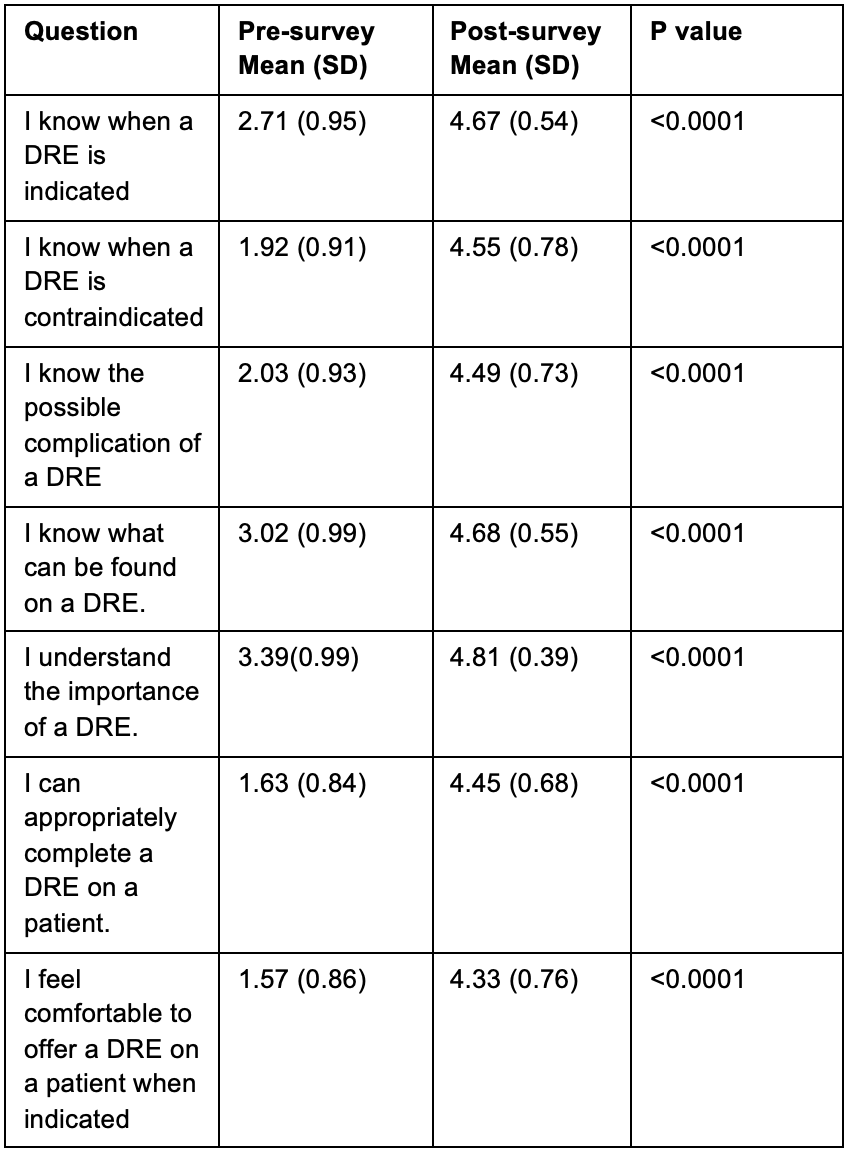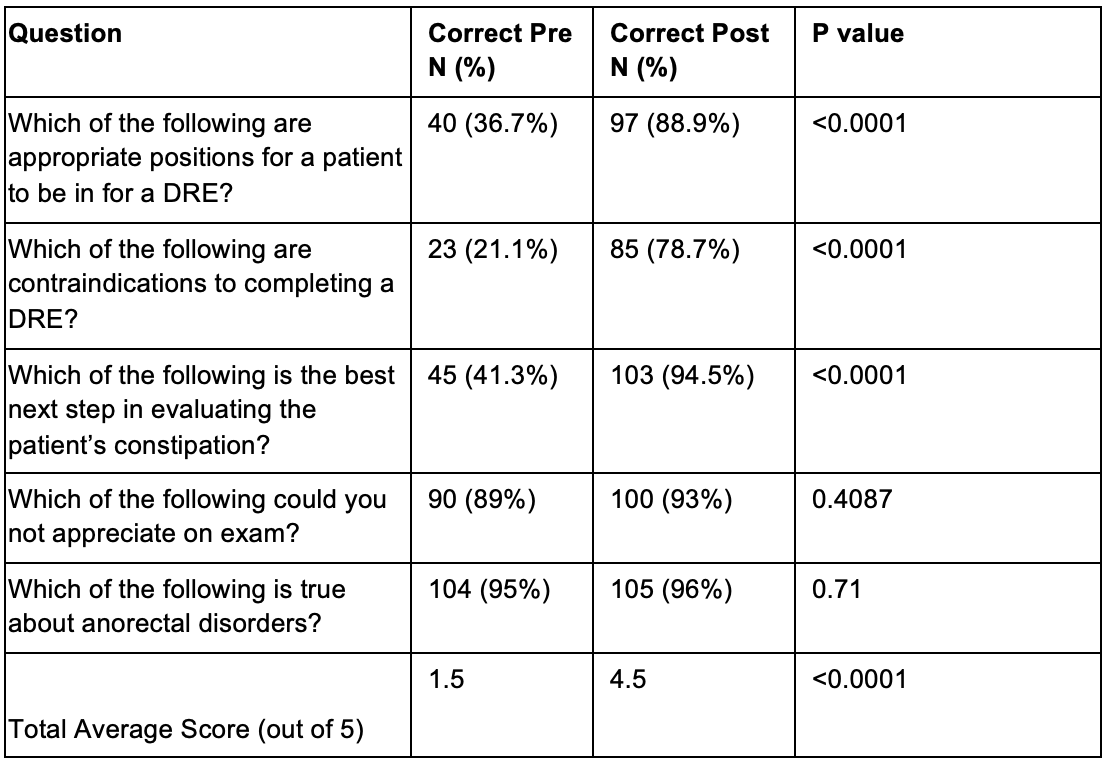Sunday Poster Session
Category: Practice Management
P1924 - Reviving the Digital Rectal Exam: A Flipped Classroom Approach for Third-Year Medical Students
Sunday, October 26, 2025
3:30 PM - 7:00 PM PDT
Location: Exhibit Hall

Theja V. Channapragada, DO, MBA, MS (he/him/his)
Penn State Health Milton S. Hershey Medical Center
Hershey, PA
Presenting Author(s)
Award: ACG Presidential Poster Award
Theja V. Channapragada, DO, MBA, MS1, Smriti Kochhar, DO2, Hadie Razjouyan, MD1, Nabeel M.. Akhtar, MD1
1Penn State Health Milton S. Hershey Medical Center, Hershey, PA; 2Penn State College of Medicine, Hershey, PA
Introduction: The digital rectal exam (DRE) is an important exam to evaluate patients who present with anorectal concerns. However, it is infrequently performed by medical students due to deficiencies in knowledge, discomfort, or inexperience. Studies have suggested that structured education can improve their confidence and knowledge to perform DREs. We used an innovative flipped-classroom approach to teach third-year medical students (MS3s) the DRE in order to promote its use in clinical practice.
Methods: One hundred thirty-one MS3s were required to participate in a DRE session in their Transitions to Clerkships course prior to the start of clerkships in March 2025. MS3s asynchronously viewed an instructional video highlighting the DRE. MS3s then attended a 30-minute workshop featuring high-fidelity manikins to practice the DRE and to ask questions and get feedback. To evaluate the session, MS3s were invited to complete pre- and post-session surveys, which included multiple-choice questions measuring knowledge about the DRE, Likert-scale questions measuring attitudes (1= Not confident at all, 5 = Extremely confident) about their knowledge of and completing the DRE, and questions regarding their history of completing the DRE. Paired t-tests assessed the pre/post changes (p< 0.05 considered significant).
Results: Matched pre- and post-session data were analyzed for 123 students. Pre-session, < 5% had ever performed a DRE; 68% had received prior education. Post-session, significant improvements (p< 0.001) in attitudes about the exam’s indications (2.71 ± 0.95 to 4.67 ± 0.54), contraindications (1.92 ± 0.91 to 4.55 ± 0.78), complications (2.03 ± 0.93 to 4.49 ± 0.73), possible findings (3.02 ± 0.99 to 4.68 ± 0.55), and importance (3.39 ± 0.99 to 4.81 ± 0.39). Attitudes in performance improved from 1.63 ± 0.84 to 4.45 ± 0.68 (See Table 1). Correct number of knowledge-based questions improved from 1.5/5 to 4.5/5 (p< 0.001), notably in patient positioning, next steps in evaluation, and contraindications (See Table 2).
Discussion: Our flipped-classroom approach with simulation improved MS3s’ attitudes and knowledge regarding the DRE. Our medical innovation was unique because it included an entire class for an economical and time-limited session. MS3s could then practice this exam in any clerkship or specialty. Based on the evaluation, the session will be held next year. Future studies can assess frequency and technique on patients.

Figure: Table 1: Pre- and Post-Intervention Attitude Scores Among Medical Students Regarding Digital Rectal Examination (DRE). Mean Likert scores significantly improved across all domains following a small group flipped classroom intervention.

Figure: Table 2: Pre- and Post-Intervention Knowledge Scores on DRE Technique and Indications. Students demonstrated significant improvement in DRE-related clinical knowledge, with the number of correct responses increasing across most domains following the intervention.
Disclosures:
Theja Channapragada indicated no relevant financial relationships.
Smriti Kochhar indicated no relevant financial relationships.
Hadie Razjouyan indicated no relevant financial relationships.
Nabeel Akhtar indicated no relevant financial relationships.
Theja V. Channapragada, DO, MBA, MS1, Smriti Kochhar, DO2, Hadie Razjouyan, MD1, Nabeel M.. Akhtar, MD1. P1924 - Reviving the Digital Rectal Exam: A Flipped Classroom Approach for Third-Year Medical Students, ACG 2025 Annual Scientific Meeting Abstracts. Phoenix, AZ: American College of Gastroenterology.
Theja V. Channapragada, DO, MBA, MS1, Smriti Kochhar, DO2, Hadie Razjouyan, MD1, Nabeel M.. Akhtar, MD1
1Penn State Health Milton S. Hershey Medical Center, Hershey, PA; 2Penn State College of Medicine, Hershey, PA
Introduction: The digital rectal exam (DRE) is an important exam to evaluate patients who present with anorectal concerns. However, it is infrequently performed by medical students due to deficiencies in knowledge, discomfort, or inexperience. Studies have suggested that structured education can improve their confidence and knowledge to perform DREs. We used an innovative flipped-classroom approach to teach third-year medical students (MS3s) the DRE in order to promote its use in clinical practice.
Methods: One hundred thirty-one MS3s were required to participate in a DRE session in their Transitions to Clerkships course prior to the start of clerkships in March 2025. MS3s asynchronously viewed an instructional video highlighting the DRE. MS3s then attended a 30-minute workshop featuring high-fidelity manikins to practice the DRE and to ask questions and get feedback. To evaluate the session, MS3s were invited to complete pre- and post-session surveys, which included multiple-choice questions measuring knowledge about the DRE, Likert-scale questions measuring attitudes (1= Not confident at all, 5 = Extremely confident) about their knowledge of and completing the DRE, and questions regarding their history of completing the DRE. Paired t-tests assessed the pre/post changes (p< 0.05 considered significant).
Results: Matched pre- and post-session data were analyzed for 123 students. Pre-session, < 5% had ever performed a DRE; 68% had received prior education. Post-session, significant improvements (p< 0.001) in attitudes about the exam’s indications (2.71 ± 0.95 to 4.67 ± 0.54), contraindications (1.92 ± 0.91 to 4.55 ± 0.78), complications (2.03 ± 0.93 to 4.49 ± 0.73), possible findings (3.02 ± 0.99 to 4.68 ± 0.55), and importance (3.39 ± 0.99 to 4.81 ± 0.39). Attitudes in performance improved from 1.63 ± 0.84 to 4.45 ± 0.68 (See Table 1). Correct number of knowledge-based questions improved from 1.5/5 to 4.5/5 (p< 0.001), notably in patient positioning, next steps in evaluation, and contraindications (See Table 2).
Discussion: Our flipped-classroom approach with simulation improved MS3s’ attitudes and knowledge regarding the DRE. Our medical innovation was unique because it included an entire class for an economical and time-limited session. MS3s could then practice this exam in any clerkship or specialty. Based on the evaluation, the session will be held next year. Future studies can assess frequency and technique on patients.

Figure: Table 1: Pre- and Post-Intervention Attitude Scores Among Medical Students Regarding Digital Rectal Examination (DRE). Mean Likert scores significantly improved across all domains following a small group flipped classroom intervention.

Figure: Table 2: Pre- and Post-Intervention Knowledge Scores on DRE Technique and Indications. Students demonstrated significant improvement in DRE-related clinical knowledge, with the number of correct responses increasing across most domains following the intervention.
Disclosures:
Theja Channapragada indicated no relevant financial relationships.
Smriti Kochhar indicated no relevant financial relationships.
Hadie Razjouyan indicated no relevant financial relationships.
Nabeel Akhtar indicated no relevant financial relationships.
Theja V. Channapragada, DO, MBA, MS1, Smriti Kochhar, DO2, Hadie Razjouyan, MD1, Nabeel M.. Akhtar, MD1. P1924 - Reviving the Digital Rectal Exam: A Flipped Classroom Approach for Third-Year Medical Students, ACG 2025 Annual Scientific Meeting Abstracts. Phoenix, AZ: American College of Gastroenterology.


